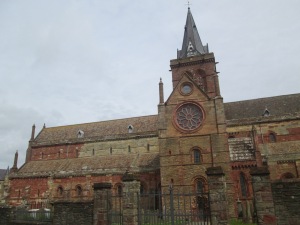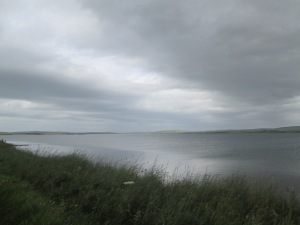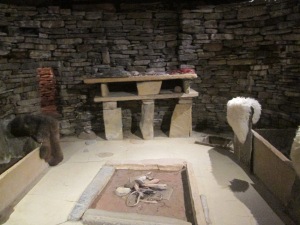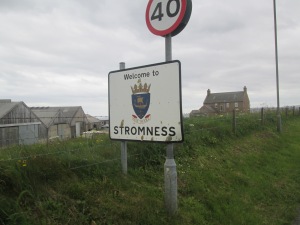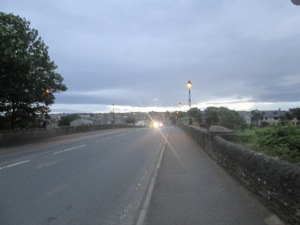‘It’s extraordinary.’
‘It’s brilliant!’ – Aiden’s reply, on the life and death practices of the Neolithic people of Orkney.
A couple of days back, I found out that wind farms were a visual pest on Orkney. Having spent the night sleeping under one, I can say that they’re not so bad, sonically speaking. The night’s howling wind sent the turbine propeller into warp speed ten, but its gentle hypnotic patter and the tent’s protection from the rain combined into a cosy cocoon.
In the morning light, my tent and I find ourselves ridiculously exposed to the string of houses near opposite. I pack up furtively, and cycle back to Kirkwall for a second examination. At night, the harbour town was deserted and intriguing. By day, it is bustling with tourists, locals, and people plying some kind of trade towards each. Along its semi-pedestrianised narrow main lane, I pass puppeteers and horse-drawn carriages by the tourist cafes, mega dealz discount shops and gift stores. The bait? Laid out nearby are the grand St. Magnus Cathedral and the ruins of the nearby Bishop’s and Earl’s Palaces. Around nine tenths of the current population of Orkney seem to be around these two proximate sites, documenting any kind of visual feature with the kinds of cameras that a decade back paparazzi would have sold their mother’s kidney for.
There’s not much to the ruined palaces, and there’s a high fee for entry, so I peer into the interesting wreckage of Watergate, before following the multitudes into St. Magnus. Inside are more intriguing plaques with same skull motifs as on Shetland. It suggests a shared morose Norse culture, caught in oddly beautiful designs worthy of tattoos or coffee-table book collections. After Shetland and the scrambled mental maps of its locals, Orkney seems a good place to find the last refuge of Edwin Muir, the first major English translator (with his wife Willa) of Kafka’s novels. The monuments to death in the cathedral are striking, from sleeping statues to these morbid plaques, and I breathe it all in with the due degree of solemn reverence.
Subtract the other visitors from the surroundings, and it might be an arresting place. Otherwise it’s a cathedral much like any other, its distinctively thick red bricks achieving a coarser effect than the intricate gothic of Lichfield or York.
I find Orkney’s one library in town, which doubles up as a lounge full of international tourists, gazing and tapping at tablets and phones. Inside I peer through the Orkney dictionary and its history books, whilst local librarians teach children about books (‘Oh Charlotte’s Web!’ ‘Have you read this?’) as well as how to use a hand-drier. These moments juxtapose against each other, as Kirkwall does in parts, from pretty harbour and cathedral to tourist tat, overpriced wool and a 1970s empty job centre. The contradictions thread together, indicating a coherent, pleasant, oddly ‘British’ experience.
But how do Orcadians consider their own identity?
By its history, and its islands status, many see themselves as something unique, a fusion of Norse and Scots with its own unique character and dialect. It’s one of the few places I visit where there are multiple places preserved (or, at least, re-discovered) from Neolithic and Mesolithic times. As I leave Kirkwall and head west, past the harbour and Finstown, I reach Maeshowe, a small settlement with a spectacular covered cairn, or tomb, some 5000 years old. Inside the covered tomb are Viking runes from the 12th century, graffiti left by previous tourists and raiders perhaps. Just by Maeshowe there’s the Standing Stones of Stenness, four rocks and a central hearth. There were once 11 or 12 stones here, and another site nearby, but the passage of time (and a crazed Victorian farmer with a lot of dynamite) have seen much of it disappear. This structure here no doubt had some ceremonial and religious use. Archaeologists guess that creating the site would’ve taken 50,000 hours – or around 50 people working for 40 hours a week, for six months. Such labour would have had some communal or spiritual repayment. I spy some graffiti from 1880, the initials W.H. William Harris, Walter Hopkins, or who? It doesn’t matter. It’s a statement that says I exist. It’s a testament to life, to the power of living, just like the beautiful patterns of the lichen on these ancient stones.
What are we really, when we face ourselves in these stones risen during the composition of the Old Testament? The consciousness that temporarily filled up a physical mass, a consciousness that itself continually changed and developed through the acquisition of memory and experience, til ill health reduced its fire, and death extinguished it altogether.
A mile away is the more impressive, indeed staggering Ring of Brogdar, a great henge on a small slither of land between Lochs Harray and Stenness, a beautiful RSPB-preserved bay. Only Avebury and Stonehenge rival it in size. It was built around 4500-4000 years ago on a much larger scale than Stenness, with stones coming from each corner of the Orkney islands. Its exact purpose isn’t known, and remains subject to speculation across the island. It was the main topic of conversation in the bar of the Auld Motor Hoose the previous night.
‘You can make it of what you want. Nobody knows with any certainty’ said one young woman from Orkney. The man beside her, evidencing being pissed off with some earlier, unspoken grievance, burned a little brighter as she said this.
I tried to access his thought: bullshit relativism! No, we don’t all get an equal chance! I try so fucking hard and get nowhere, and you’re saying my effort is as good as not giving a fuck? Take a second to cut beneath the bullshit, and life is a fucking ugly and unfair struggle.
He stewed on his Guinness, whilst the barman, a local lad with a toned-down accent suggesting a few years at a good university in England followed by inconsequential job applications, poverty, and the ferry back home to the old folks, volunteered that an elaborate cult of bone-preservation took place at sites like the Tomb of the Eagles, where bodies were allowed to rot, then dead flesh was picked dry. Over generations, a set of bones would be moved from one chamber to another, many becoming mixed with each other. As he described it,
‘They didn’t keep track of whose bones went where. There were stages, higher stages. All the bones got mixed up.’
As he explains it, they were operating to an entirely different understanding of life and death to ours. The individual specificity of the bones was not important; what mattered was the greater power as an ancestral force to impose order and continuity on the present. At Brogdar this feeling is further confirmed. Beyond the circular set of standing stones, brought from all across Orkney and built with a bank over at least a six month, full-time period. The stones, cairns and mounds around us in the distance suggest that some kind of major social and ceremonial site was here.
Perhaps it’s the same as the strange belief practices that the ancient Greek Diodorus Siculus mentions in his Library of World History, of worshipping circles, and gods coming to life. The Greeks believed that there were a people that lived beyond the North Wind, the Hyperboreans. Their’s was a perfect land, where the sun shone twenty four hours a day. It’s tempting to think some lost Greek vessel found Orkney, Shetland, or somewhere further north.
The stones may represent the dead in some form. Ancestor worship is a feature of the tombs discovered here, and these ceremonial, ‘tribal’ stones from each corner could each be an attempt to harness the power of the community, remember the dead, and establish a link of power between this life and the next. All this is speculation. I travel on seeking out more evidence of Orkney’s strange and distinct history, heading to Skara Brae on the west coast of the Orkney mainland, by the Bay of Skaill. A largeish Neolithic settlement has been preserved immaculately here. I wonder round its remains, largely the foundations of around ten dwellings by the sea. In themselves there isn’t much to make sense of, and the dwellings are fenced away from tourists, so I talk to a young woman standing in the cold with the job of answering irritating questions from tourists.
‘These houses are built out of waste, literally. We call it midden. It’s the remains of food, of…’
‘Shit?’
‘Aye, and of the dead. I think they wanted to have a close connection with the dead.’
She tells me about how these people might have lived. The temperature was warmer 5000 years ago, and the homes were additionally covered in grass to retain warmth. Inside, these people lived on shellfish, and farmed some cattle and craps. They wore animal skins, and no weapons have been found in their remains, suggesting a peaceful existence.
‘Were they happy?’ It’s a strange question I know, but forgive me.
‘We don’t know, but they were peaceful. And they lived close together, in close communities. They didn’t leave in a hurry either. Just one day, they went. Perhaps sea water contaminated their water supply after a storm.’
She looks at me and smiles, to indicate, who knows?
Again, it reminds me of what our own civilisation will leave behind to those humans that find our remains some 5000 years hence. Will it be the crushed remains of tablet screens, or polystyrene takeaways boxes, or spent nuclear waste in the hills? And what is there, in the ways in which most of us live in these islands, to suggest that our lives are any happier, better fed, personally nourished or spiritually satisfied than these folk?
It’s coming time to leave Orkney. In the island’s free newspaper, the local Member of the Scottish Parliament (also covering Shetland too) writes to complain that the SNP’s programme for independence offers no real commitment to giving the isles independence. I get the feeling that Scottish independence is a distant prospect here, and not one that many are warm to. People on Shetland would joke that the nearest train station was Bergen (in fact, it is Thurso, but as Robin told me, ‘anything above Aberdeen doesn’t exist’, the place where Shetlanders get the ferry into Scotland).
All this confuses, once again, what one might call Britain. If we mean a geographic entity, then Orkney, Shetland, the Hebrides, and Northern Ireland, as well as many other islands, are excluded. Asking them to put GB on their number-plates is a little inaccurate, if not insulting. If we mean the political union of the United Kingdom, then places like the Isle of Man or the Channel Islands are not part of the UK, but crown dependencies. The historical UK has changed: it once incorporated all of Ireland, so another state could secede or be granted independence. Then there is Gibraltar, the Falklands, Bermuda – around fourteen British overseas territories that fall under the jurisdiction of the UK but do not form part of it. They are the remnants of the British empire, and most retain the Queen as their head of state. So which Britain do we mean? Discussions of nation, nationality, and collective belonging are so vague and confused. It’s time to begin a new discussion.
Well… I cycle back to Stromness, past empty rolling fields where curlews, corncrakes and oyster-catchers pip and squeak in the late afternoon. Stromness itself is a small harbour village built for the Hudson Bay Company. I’m just in time for my ferry back to the mainland, and get aboard. I’m persuaded to buy a £7 upgrade to the Magnus lounge, which gets me … two free drinks, and a fridge full of beer all to myself. As well as many pastries I can fit into my bag, and a cappuccino machine I make good use of. The Orcadian Scapa malt whisky is damn good, peaty and smoky, and I wash it down with very many beers from the Orkney brewery. Fine fine brews: Northern Light, Red MacGregor, Raven Ale.
Ok, I admit it. Missing some specifically female company, I have become quite the lush. Beer and whisky have replaced hugs and kisses, whilst fiery flickers of conversation with locals and oddballs have substituted for the amiable familiarity of friends.
As I capitalise on the hospitality, a family enters the otherwise quiet lounge. Two men sit about quite bored in separate corners, either looking at me with my Shane MacGowan rider of coffees and strong brews, or staring at newspapers that appear as intriguing as annual tax return reports.
The father ushers in his partner and two daughters impatiently. I imagine him demanding that ‘I’m on driving duty’, reciting the experience when his weary wife made some wrong-turn many moons ago. She reads the map and he corrects her, then makes a wrong turn at the A 6049203210 and ends up at the wee hamlet of Shagbestlygropebog (home of yet another ruined fortification from an absurd medieval skirmish) instead of West Miserpish-on-Kebab.
Avoiding the ferry’s bar with a driver’s simmering resentment, he sits atop the windswept deck, finding some appreciation of his solitude in the callous squall of the sea, content to swallow him whole in a second should he tumble overboard. I notice his wife disappear, looking for him perhaps, or perhaps not. She returns empty, and attempts sleep on a sofa, whilst her bored daughters laugh and throw bits and bobs at her. I think back to my own parents growing up, long separated now, and their infinite patience bringing up me, my brother and sister. It takes a well-seasoned life of experiences and evenings in the company of other families to realise, for me at least, that I have been blessed like nobody else with the kind, liberal and loving beings who were mad enough to sire us three.
Love can be an inheritance. One can be taught to love by having it generously bestowed. Such generosity of love in turn demands difficult self-sacrifices. I’m not sure I could love with the same strength and kindness as my mum and dad, but as the parents I’ve met on the road each explain, once they’re there, those little parts of you, that’s it. I find it all strange and wondrous.
In the local Orcadian is some wonderful non-news. Instead of the immolations, rapes of the elderly and routine youth stabbings of your standard south London ragsheet, I read of more drunken misadventures on the ferries, staff bullying at Stromness Academy, and a new hospital that plans to rely on renewable energy. Well, you might as well do something with all that wind eh? On page 2, an article chillingly warns that THREE ocean liners will land in Kirkwall filled with tourists. Beware, an invasion! With some degree of fear, the rag reports that some pished local’s jeep was nicked outside a boozer in St. Margaret’s Hope, driven drunkenly into a wall, and abandoned near one of the Italians’ Churchill barriers. I can’t help laughing at the scene in mind.
I wobble off the ferry as it docks in Thurso and meet John, my host for the evening. He’s Victoria’s husband and is refurbishing some flats for rental over here. He bundles the bike into a large, self-customised transit van and whizzes us into Thurso town and tells me about his love of Scotland. He’s from the south-east like Victoria, and has spent a life working first in the merchant navy, then moving from building, to managing a learning disability service, to now making art and carrying off little projects over the summer, and arranging goose hunts and fishing holidays in Orkney over the winter. Each year many of the same people come back to enjoy John’s hospitality, the thrill of the hunt, and the delights of Orkney. If it’s your thing, I recommend you contact him to find out more. He’s a wise, kind, true gentleman: john.vincent8@btopenworld.com.
We settle in, and a few minutes later, John returns with Thibault, a hiker from France who he’s just met in the street. He’d asked for directions to the youth hostel, and John instead invited him to stay here for free. Such kindness you get! Over dinner the conversation continues, and we share travel tales. Being of different nations and backgrounds, discussion naturally shifts to a comparison of attitudes to this and that. Xenophobia comes up.
‘When things are not going well, they raise their finger and point at these ones and say, it’s his fault. And people forget about the real problems. It happens all the time.’
The recent coverage of dangerous Islamic terrorists in the compost-bin that serves as the British press would suggest that France isn’t alone. Compared to the level of pessimism and fear that consumes political discussions in England and France, it’s refreshing to look back and compare Scotland, or Orkney and Shetland, where independence and the future are on the agenda. Asking whether one wants to be independent is to ask what kind of society would one like to live in? And this question has disappeared from the agenda in England at least for some decades. A belief in the future, and a desire to create, collectively, a better one. These are possibilities that can resurface, desires that can be rearticulated.
I’ve arranged to speak to Louise, an English lady living in Drumnadrochit, back in Inverness, and a contact that Chris in Edinburgh thankfully set up for me. She has put her two children through a Gaelic medium (a Gaelic-speaking school), and I’m interested to know why, and how their experiences have been. She tells me that she sees a real benefit in them having a second language. ‘It helps with learning, becoming bilingual from a younger age.’
There are some advantages: the Gaelic medium has smaller class sizes, and helps root her children to the culture that they’ve moved into. She describes how her children are becoming good speakers, particularly her daughter. There was a recent social event where an older man could communicate with her daughter fluently. It touches Louise. She’s also learned Gaelic along with her children, though doesn’t have the language to the same extent. But the children ‘identify as Scottish, definitely.’ The ability to speak Gaelic is a ‘good thing’, a way that connects Scottish identity back to its roots. It’s a difficult operation of course: an Americanised popular culture makes English the norm everywhere, and there are several centuries of repressive history and Clearances to, well, clear away. But I get the impression that among the young, in the Highlands at least, Gaelic is having a marked resurgence. I’m even more intrigued now by what I’ll encounter in the north-western Highlands and Hebrides.
I’m inspired and made alive by the day. With Thibault, we drink the last of the pilfered ales and share the stories of our lives. Friends have been made, and stories discovered. Such are the wonders and pleasures of travelling on your doorstep or into the distance, anywhere, everywhere.









